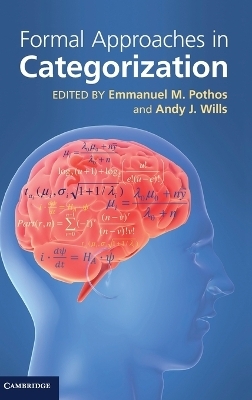
Formal Approaches in Categorization
Cambridge University Press (Verlag)
978-0-521-19048-0 (ISBN)
The process of constructing concepts underpins our capacity to encode information in an efficient and competent manner and also, ultimately, our ability to think in terms of abstract ideas such as justice, love and happiness. But what are the mechanisms which correspond to psychological categorization processes? This book unites many prominent approaches in modelling categorization. Each chapter focuses on a particular formal approach to categorization, presented by the proponent(s) or advocate(s) of that approach, and the authors consider the relation of this approach to other models and the ultimate objectives in their research programmes. The volume evaluates progress that has been made in the field and where it goes from here. This is an essential companion to any scientist interested in the formal description of categorization and, more generally, in formal approaches to cognition. It will be the definitive guide to formal approaches in categorization research for years to come.
Emmanuel M. Pothos is a Reader in the Department of Psychology at Swansea University. Andy J. Wills is an Associate Professor in the School of Psychology at the University of Exeter.
1. Introduction Emmanuel M. Pothos and Andy J. Wills; 2. The generalized context model: an exemplar model of classification Robert M. Nosofsky; 3. Prototype models of categorization: basic formulation, predictions, and limitations John Paul Minda and J. David Smith; 4. COVIS F. Gregory Ashby, Erick J. Paul and W. Todd Maddox; 5. Semantics without categorization Timothy T. Rogers and James L. McClelland; 6. Models of attentional learning John K. Kruschke; 7. An elemental model of associative learning and memory Evan Livesey and Ian McLaren; 8. Nonparametric Bayesian models of categorization Thomas L. Griffiths, Adam N. Sanborn, Kevin R. Canini, Daniel J. Navarro and Joshua B. Tenenbaum; 9. The simplicity model of unsupervised categorization Emmanuel M. Pothos, Nick Chater and Peter Hines; 10. Adaptive clustering models of categorization John V. McDonnell and Todd M. Gureckis; 11. COBWEB models of categorization and probabilistic concept formation Wayne Iba and Pat Langley; 12. The knowledge and resonance (KRES) model of category learning Harlan D. Harris and Bob Rehder; 13. The contribution (and drawbacks) of models to the study of concepts Gregory L. Murphy; 14. Formal models of categorization: insights from cognitive neuroscience Lukas Strnad, Stefano Anzellotti and Alfonso Caramazza; 15. Comments on models and categorization theories: the razor's edge Douglas Medin.
| Erscheint lt. Verlag | 27.1.2011 |
|---|---|
| Zusatzinfo | 12 Tables, black and white; 49 Line drawings, unspecified |
| Verlagsort | Cambridge |
| Sprache | englisch |
| Maße | 156 x 235 mm |
| Gewicht | 690 g |
| Themenwelt | Geisteswissenschaften ► Psychologie ► Allgemeine Psychologie |
| Geisteswissenschaften ► Psychologie ► Verhaltenstherapie | |
| Naturwissenschaften ► Biologie ► Humanbiologie | |
| Naturwissenschaften ► Biologie ► Zoologie | |
| ISBN-10 | 0-521-19048-7 / 0521190487 |
| ISBN-13 | 978-0-521-19048-0 / 9780521190480 |
| Zustand | Neuware |
| Haben Sie eine Frage zum Produkt? |
aus dem Bereich


